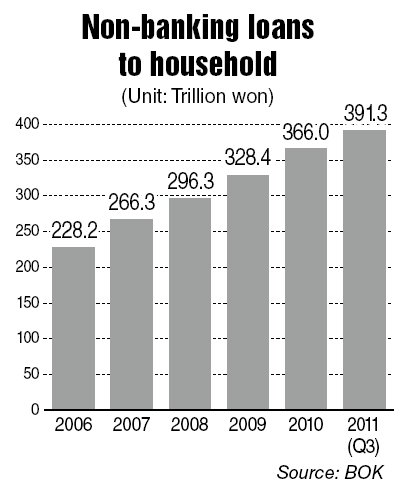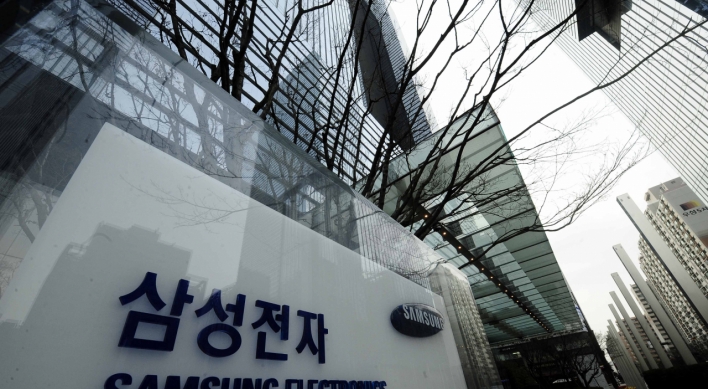More households borrow from secondary banking sector
By Korea HeraldPublished : Nov. 22, 2011 - 17:25

Loans provided by savings banks, insurance companies, credit card companies and other non-bank institutions grew 163 trillion won ($142 billion) in the past five years, swelling 1.6 times faster than loans from commercial banks.
Korean households now owe 391.29 trillion won, or 46.5 percent of their total debt, to the secondary banking sector. Debt from the secondary banking sector accounted for 39.7 percent in 2006.
The weight of borrowing from the secondary banking sector is of a particular concern to policymakers as it represents a bigger portion of borrowing on credit cards and impulsive spending. The third quarter figure marked its highest level since 2008 when the Bank of Korea first began to compile the data.
“More borrowing from the secondary banking sector means more people are cornered into turning to high-interest loans or are taking out more debt on top of what they owe at commercial banks,” Jeong Young-Sik, a research fellow at Samsung Economic Research Institute said.
“The increase is very worrisome as loan delinquency rates tend to be higher at credit card firms, insurance companies.”
Jeong attributed the increase in part to Seoul’s control of household debt.
The Financial Services Commission has been tightening lending at commercial banks but this has pushed more people toward credit at non-banking institutions, he said. Debt from credit cards, mostly owed to department stores and car makers, stood at 51.5 trillion won.
Overall household debt reached a fresh high of 892.5 trillion won as of September after increasing by 16.2 trillion won in the July-September period alone.
“Borrowing from insurance companies jumped 3 trillion won in the third quarter, compared to the 500 billion won increase in the preceding quarter, which looks to be a result of the strengthened restriction on loans at commercial banks and the rising costs of living,’’ said a central bank official.
The rise of debt from the secondary banking sector came despite the recent industry-wide probe on the savings banks industry. Regulators have suspended a total of 16 savings banks this year alone to purge the lenders that have been badly exposed to the toxic housing projects.
By Cynthia J. Kim (cynthiak@heraldcorp.com)
-
Articles by Korea Herald





![[KH Explains] No more 'Michael' at Kakao Games](http://res.heraldm.com/phpwas/restmb_idxmake.php?idx=644&simg=/content/image/2024/04/28/20240428050183_0.jpg&u=20240428180321)



![[Grace Kao] Hybe vs. Ador: Inspiration, imitation and plagiarism](http://res.heraldm.com/phpwas/restmb_idxmake.php?idx=644&simg=/content/image/2024/04/28/20240428050220_0.jpg&u=)









![[Herald Interview] Xdinary Heroes shoot for the next level with 'Troubleshooting'](http://res.heraldm.com/phpwas/restmb_idxmake.php?idx=642&simg=/content/image/2024/04/29/20240429050745_0.jpg&u=)